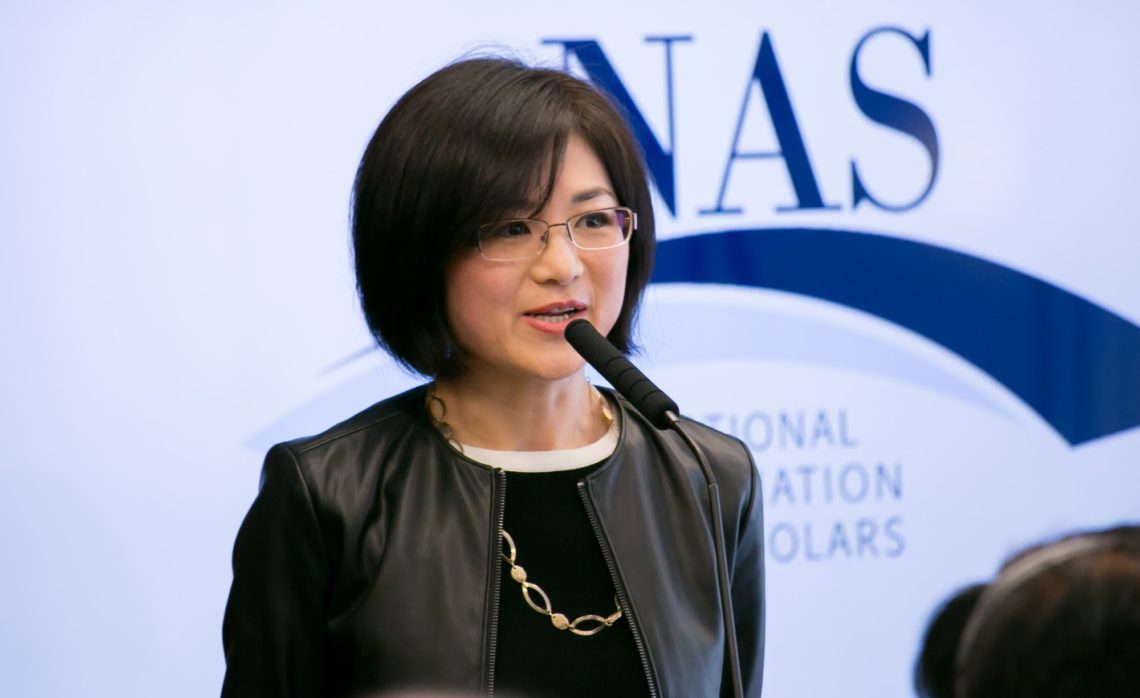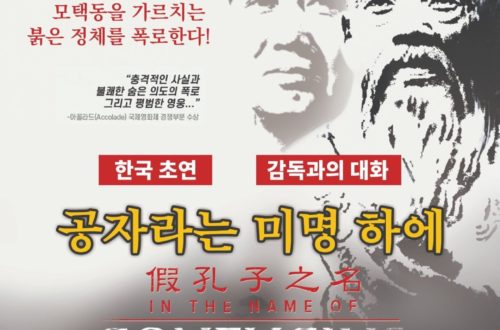
Remarks at the US Premiere of In the Name of Confucius
(Washington D. C., 2017-04-26, watch Doris’ speech here starting at 41:07)
First of all, I would like to thank the Alliance Defending Freedom and the National Association of Scholars for organizing today’s event. I also wanted to congratulate Ms. Rachelle Peterson for compiling such a solid report on the Confucius Institute. I think this is an extremely important issue that needs attention from governments to members of the public, because it affects our education system by the Chinese government, and it affects it from within; universities are essential to preserve the core values and democratic character of our free societies. They should be havens for freedom of expression and academic integrity. However, evidences have shown that by allowing Confucius Institutes to enter our campuses, the host universities and schools have allowed these principles to be compromised. And that is the reason I decided to make this documentary In the Name of Confucius.
The film features the exclusive personal story of a former Confucius Institute instructor Sonia Zhao. Sonia escaped the institute and filed a human rights complaint that let to the first ever closure of a CI on a North American campus. The film also profiles Canada’s largest school board, the Toronto District School Board, when it was facing a public outcry against its plan to open a Confucius Institute in its schools. It took me 3 years to make this film, during the time I visited or spoke with universities and schools across Canada; trying to find out reasons they welcomed or rejected the Confucius Institute. Oftentimes, the CI host institutions didn’t want to participate in the film or talk about the controversies surrounding the Confucius Institutes. Remarkably, none of them seemed to be worried about the controversies; rather they boasted their close relationship with the Chinese government.
One particular story that didn’t end up in the film was that of the Brock University near the Niagara Falls. Its Confucius Institute didn’t have a Chinese director at the time I contacted them, but instead there were two faculty members serving as CI co-directors; both are originally Chinese immigrants like myself. Initially the directors were very happy to have us on campus. We had scheduled two days’ of filming. But the night before the second day, one director sent me an email, asking me to sign a Media Consent that gave them the right to pre-screen or withdraw any interview content that they didn’t want to publish. I believed that was a reaction to my interviews with the other co-director on the first day. I had asked him what he thought about Canada’s McMaster University closing its Confucius Institute because of the CI’s discriminatory hiring policy excluding Falun Gong practitioners. He said it wouldn’t affect their CI because their CI was in line with the university’s globalization strategy. But obviously they didn’t appreciate my questions and so they requested I sign the Media Consent form. Of course I wouldn’t give up my editorial rights. And as a result I wasn’t able to go back to the campus to conduct the 3 scheduled interviews the next day.
This university also asked a Tibetan student not to show a Tibetan flag to represent her identity in an annual activity that was supposed to celebrate various nationalities on campus. It turned out that it was the CI director who asked the activity coordinator to tell the Tibetan student not to show Tibetan flag.
Confucius Institutes have strict control to their Chinese staff. Sonia shared one of her experiences working at the Confucius Institute in McMaster University. One day she and two colleagues borrowed a movie DVD from a local library called Seven Years in Tibet, starring Brad Pitt. Sonia and her roommates were shocked to see in the movie that the Tibetan lamas were killed by the People’s Liberation Army when the lamas didn’t accept the Communist party ruling. And they learned that Brad Pitt was banned from entering China after playing in the film. This was something totally different than what they were taught in China, so the next day the three girls were discussing the film in their office. The Chinese CI director stopped them and warned, “If you continue talking about the film, you would have to write a self-criticizing report when you go back to China.” Self-criticizing reports are tools created by the Chinese Communist Party for officials to reflect on their conduct if they violate the Communist Party line. Sonia told me, “Although I was outside China, in the Confucius Institute, they do require that you follow the party line.”
On one hand, CIs don’t encourage discussing certain topics, but on the other hand, they do teach students the Chinese Communist Party propaganda. You’ll soon see that in the film but here I’ll share a couple of examples that aren’t in the film. On the Confucius Institute online class, there is an animated video about the Korean War; however, in the video, the war is referred to as “the War to Resist US Aggression and Aid Korea”. And the video goes on to praise the heroic Communist Party and party members and so on. (http://bit.ly/2peGsMM) In one Canadian Confucius Institute, students were taught to sing songs that incite hatred towards the Communist Party’s enemies.
CSIS quote: “While older students may be better equipped to see through such attempts at indoctrination, Chinese academics are already drawing some satisfaction from evidence that American children who have studied under the direction of CIs have developed a more positive view of China and its political system.”
Since 1949, generations of Chinese people, including myself, have been soaked in the Communist propaganda on a daily bases from school to work place, from newspaper to TV, from literature to arts and music, and virtually everywhere. The intake of the propaganda has been an inevitable component of our lives. And day after day, the propaganda have been internalized by the Chinese and become natural. Even when we come abroad, they follow us. It took me until today to try to remove those brainwash marks.
Now the communist propaganda has sneaked into the west as we open our doors. Beijing spends an estimated $10-billion annually on “external propaganda,” and its influence extends to Hollywood film studios, news outlets, and schools and universities abroad. While we value the learning of Chinese language and culture, and the exchange between the west and China, we should always be alert to distinguish the traditional Chinese culture from the culture that was distorted by the Chinese Communist Party indoctrination.
The documentary In the Name of Confucius is a calling on the western universities and schools to reconsider their Confucius Institute partnership. It is also a calling on the western governments and public. Many of us Chinese immigrants came abroad seeking a better life. We know how precious the principles of freedom, human rights, and democracy are, and that these principles must be defended. The Confucius Institute saga is an urgent and compelling reminder that we must be ever wary of efforts to undermine these values. I hope you will enjoy watching the film today. And we will discuss further in the Q&A. Thank you.




